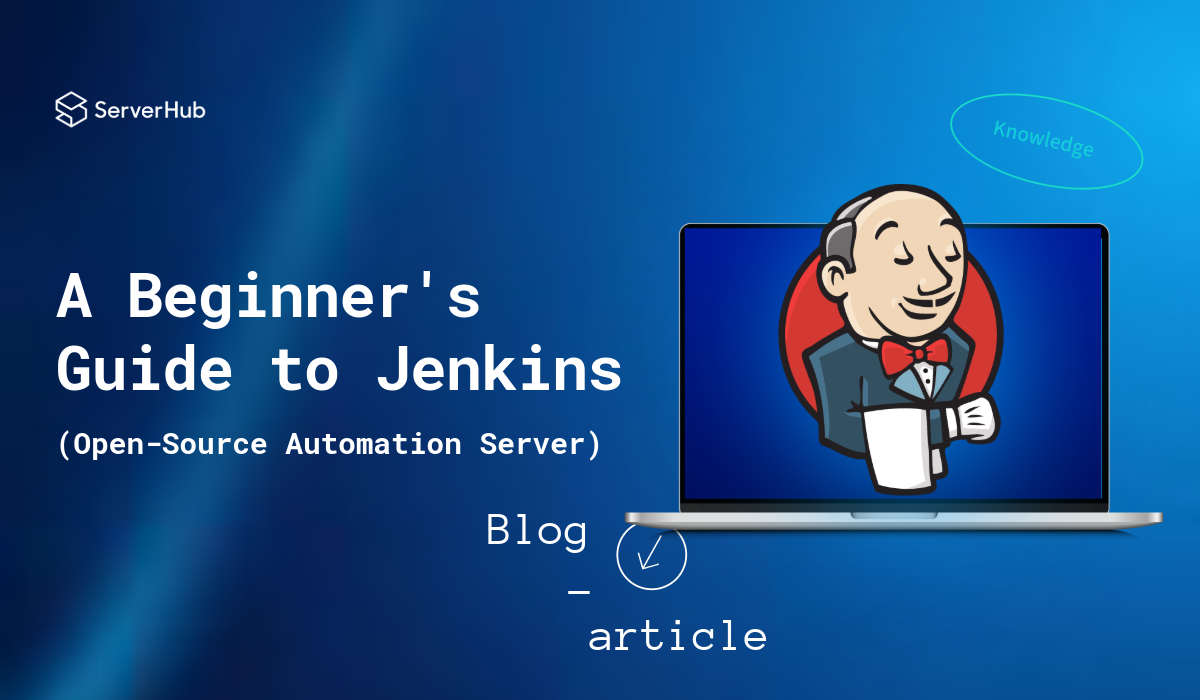What is Jenkins?
Jenkins is an open-source automation server that helps developers and teams automate various stages of the software development process. Designed in Java, it provides hundreds of plugins that extend its functionality and enable integration with virtually any tool in the DevOps ecosystem.
The Jenkins tool is mainly used for automating repetitive tasks, such as building, testing, and deploying software. It facilitates faster development cycles, enhances productivity, and reduces human errors in the development pipeline.
In this article, we’ll discuss what Jenkins is and its features, and the procedures for installing and configuring Jenkins on Linux, Windows and macOS operating systems.
Beneficial Features of Jenkins Software as an Open-Source Automation Server
Developers and development teams use Jenkins to gain access to a robust platform that simplifies tasks, improves collaboration, and allows them to focus on innovation rather than mundane, repetitive activities. With its active open-source community, Jenkins constantly evolves, ensuring it remains relevant in today's fast-paced software development environment.
The Jenkins tool offers numerous features that make it an essential tool for software developers and DevOps professionals. Its key features include:
1. Open-Source and Free: Jenkins runs on all major platforms, including Linux, Windows, and macOS, making it a versatile solution for diverse development environments.
2. Cross-Platform Compatibility: Jenkins runs on all major platforms, including Linux, Windows, and macOS, making it a versatile solution for diverse development environments.
3. Plugin Ecosystem: Jenkins boasts an extensive plugin library, with over 1,800 plugins available. This allows seamless integration with tools like Git, Docker, Kubernetes, Maven, and more.
4. Scalability: Jenkins is highly scalable, supporting distributed builds across multiple nodes. This ensures faster execution of tasks and efficient resource utilization.
5. Extensibility: The Jenkins tool can be extended to meet the unique needs of your projects. Whether you want to integrate it with cloud services or automate specific workflows, Jenkins has the flexibility to adapt.
6. Pipeline as Code: Jenkins allows users to define their build and deployment pipelines as code using a simple domain-specific language (DSL). This feature, known as Jenkins Pipeline, provides better version control and usability.
7. Community Support: With an active and extensive user community, Jenkins benefits from frequent updates, bug fixes, and a wealth of online resources for troubleshooting and learning.
8. Monitoring and Reporting: Jenkins offers real-time build progress monitoring and detailed reports on job statuses. This helps teams quickly identify and resolve issues.
Jenkins Setup Guide: Installing and Configuring Jenkins
The following procedures provide step-by-step instructions on how to install and configure the Jenkins tool on Linux, Windows, and macOS operating systems.
A. Installing Jenkins on Linux:
Prerequisites:
* Linux distribution (e.g., Ubuntu, CentOS).
* Java Development Kit (JDK) 11 or newer installed.
* Root or sudo access to the server.
Procedures to Install Jenkins on Linux:
Do the following steps and use the commands in each step:
1. Update the System:
sudo apt update && sudo apt upgrade
2. Install Java:
sudo apt install openjdk-11-jdk -y
3. Add the Jenkins Repository:
curl -fsSL https://pkg.jenkins.io/debian/jenkins.io.key | sudo tee /usr/share/keyrings/jenkins-keyring.asc > /dev/null
echo deb [signed-by=/usr/share/keyrings/jenkins-keyring.asc] https://pkg.jenkins.io/debian binary/ | sudo tee /etc/apt/sources.list.d/jenkins.list > /dev/null
4. Install Jenkins:
sudo apt update
sudo apt install jenkins -y
5. Start and Enable Jenkins:
sudo systemctl start Jenkins
sudo systemctl enable Jenkins
6. Access Jenkins: Open your browser and navigate to http://<your_server_ip>:8080. Follow the on-screen instructions to complete the setup.
B. Installing Jenkins on Windows:
Prerequisites:
* Windows 10 or later.
* Java Development Kit (JDK) 11 or newer installed.
Procedures to Install Jenkins on Windows:
Do the following steps and use the commands in each step:
1. Download Jenkins: Visit the Jenkins official website and download the Windows installer.
2. Install Java: Download and install JDK 11 or newer, then set the JAVA_HOME environment variable.
3. Run the Jenkins Installer: Double-click the downloaded .msi file and follow the installation wizard.
4. Start the Jenkins Service: After installation, Jenkins runs as a Windows service. Open your browser and go to http://localhost:8080.
5. Unlock Jenkins: During the initial setup, Jenkins will prompt you to enter an administrator password. Locate the password in the C:\Program Files (x86)\Jenkins\secrets\initialAdminPassword file.
6. Complete the Setup: Install recommended plugins and create an admin user to finalize the installation.
C. Installing Jenkins on macOS:
Prerequisites:
* Windows 10 or later.
* Homebrew package manager installed.
* Java Development Kit (JDK) 11 or newer installed.
Procedures to Install Jenkins on macOS:
Do the following steps and use the commands in each step:
1. Install Homebrew (if not already installed):
/bin/bash -c "$(curl -fsSL
https://raw.githubusercontent.com/Homebrew/install/HEAD/install.sh)"
2. Install Java:
brew install openjdk@11
3. Install Jenkins:
brew install jenkins-lts
4. Start Jenkins:
brew services start jenkins-lts
5. Access Jenkins:
Open your browser and navigate to http://localhost:8080. Follow the instructions to unlock and configure Jenkins.
Why Jenkins Should Be Your Automation Server Tool
Jenkins is a powerful and versatile automation server that has become a cornerstone of modern software development. Its open-source nature, extensive plugin ecosystem, and support for CI/CD pipelines make it an invaluable tool for developers and DevOps teams alike.
With the Jenkins setup guide discussed in this article, you now have a step-by-step process to install and configure Jenkins on Linux, Windows, and macOS. By leveraging the capabilities of this remarkable tool, you can streamline your workflows and achieve a more efficient software development lifecycle.
Dedicated Server Solutions from ServerHub
ServerHub’s dedicated server offerings are an ideal match for powering a robust Jenkins automation server, delivering enterprise-grade hardware to ensure fast and reliable build and deployment performance. ServerHub includes 10G network connectivity and provides both IPv4 and IPv6 support out of the box, ensuring seamless integration with version control systems and artifact repositories hosted remotely. Contact us now to elevate your Jenkins-powered development workflows with high-performance ServerHub dedicated server hosting!
